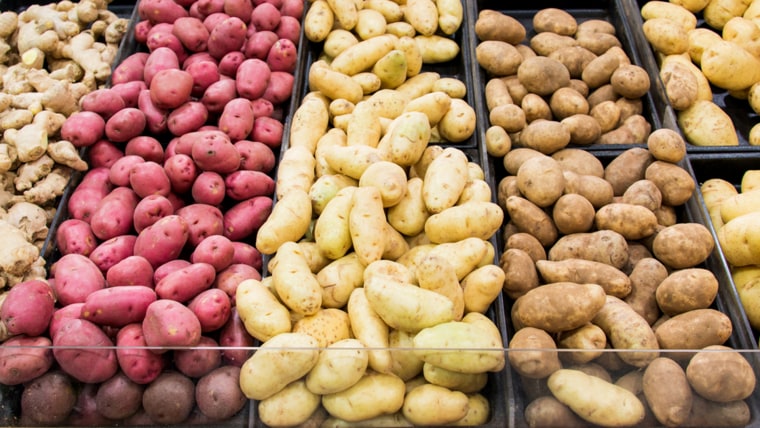No matter whether they're mashed, baked, boiled or french fried, potatoes may raise the risk of developing high blood pressure in women who have them more than three times a week, a new study suggests.
In the 20-year study, Harvard researchers examined the impact of potatoes on hypertension in more than 187,000 volunteers, according to the report published Tuesday in the British Medical Journal.
RELATED: True or not? It's OK to eat red meat and potatoes
After accounting for a host of other factors, the researchers found an 11 percent increased risk of developing hypertension among women who ate boiled, baked or mashed potatoes four or more times a week, compared to people who consumed the starchy vegetable less than once a month. The increase was even greater for those consuming french fries more than three times a week, at 17 percent. And that applied to both men and women.
It’s hard to make a strong recommendation until the results are replicated by other researchers, said the study’s lead author, Dr. Lea Borgi, an associate physician in the renal division of Harvard affiliated Brigham and Women’s Hospital.
Still, she said, “I would suggest eating less than four servings a week.”

If you need more convincing, Borgi said, take a look at the latest dietary guidelines, which suggest women consume no more than five servings of starchy vegetables a week and men, six. “If you’re consuming five servings of potatoes, then you can’t have any of the other starchy vegetables, such as yams, corn or peas.”
Intriguingly, the researchers have found no increase in hypertension related to consumption of other starchy vegetables, Borgi said.
RELATED: 'The Biggest Loser' trainer Bob Harper discusses the difficulty of keeping the weight off
Recent studies by the same group linked high potato consumption to the risk of developing diabetes and also pregnancy related, or gestational, diabetes. The researchers aren’t sure what the mechanism is for potatoes raising the risk of hypertension or diabetes. They suspect it might have to do with the vegetable’s high glycemic index, which means that it can lead to a sharper rise in blood sugar levels compared to other foods.
While noting that it’s very hard to link a specific food to a condition such as hypertension, Dr. Matthew Muldoon said “this group from Boston is one of the best and they’ve got a great data set.”
Another caveat, an observational study like this can't prove that potatoes caused the rise in blood pressure, said Muldoon, a professor at the University of Pittsburgh and director of the Hypertension Center at the University of Pittsburgh Medical Center. The findings merely suggest they do.
Potatoes are rich in nutrients: a "medium" baked potato — around 7 ounces and a 3-inch diameter — has about 160 calories and is packed with:
- 4 grams of fiber (about 20 percent of your daily count)
- 4 grams of protein
- half of your vitamin C for the day
- 25 percent of your potassium
- a third of your vitamin B6
- nearly 10 percent of your iron
Still, Muldoon said, eating potatoes every day is probably not a good choice. “The study is a reminder that just as red meat isn’t a good staple to build meals around, neither is white flour bread, pasta or potatoes. If we fail to put a priority on fresh produce, you end up where we are, which is fat, with a lot of hypertension and diabetes.”
Muldoon offered a number of food substitutes with the same nutrients, such as:
- bananas
- salmon
- white beans
- yogurt
- prunes
- spinach